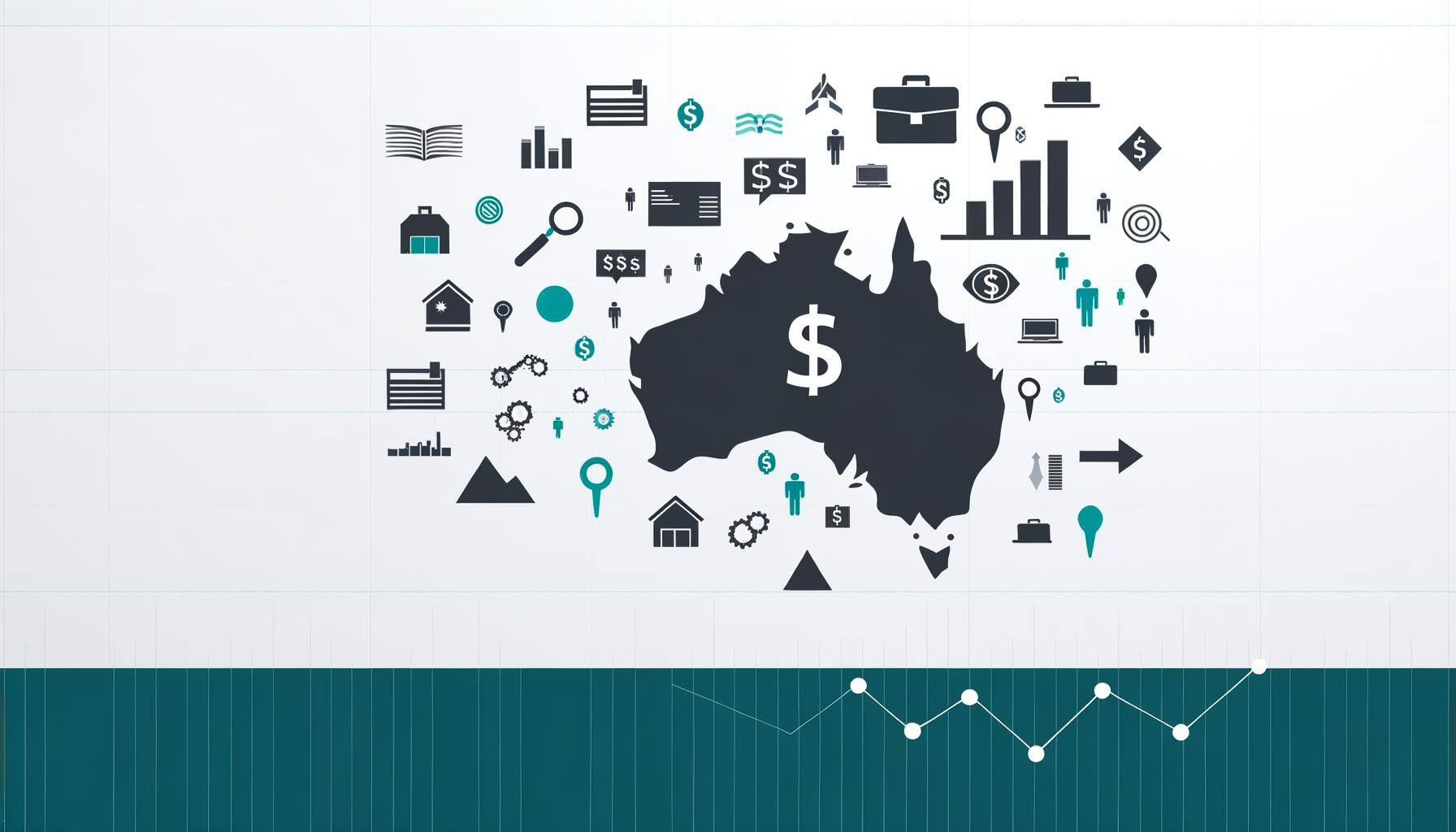Today’s business headlines feature a comprehensive overview of Australia’s economic landscape. We delve into the explosive NDIS fraud scandal, rising housing stress, robust IPO activities, corporate shifts, and the ongoing debates around energy and monetary policies. Let’s explore these pressing issues shaping our financial environment.
Explosive Fraud and Stagnating Economy: The NDIS Scandal
The stagnating economy and the $44 billion National Disability Insurance Scheme (NDIS) scandal are closely linked. Revelations this week exposed widespread fraud within the NDIS, with criminals using funds for drugs, luxury holidays, and cars.
Shocking Statistics
Nine out of ten NDIS plan managers surveyed showed signs of fraud. Prosecuting all scams would overwhelm the justice system, according to testimony in the Senate. The NDIS's cost has skyrocketed from $13 billion in 2018-19 to $44 billion this financial year and is projected to hit $61 billion by 2027-28.
Economic Impact
NDIS Minister Bill Shorten introduced changes to curb its unbridled growth, which could reach $125 billion annually by the early 2030s. This growth is straining the labour market, drawing workers from aged care, childcare, and cleaning into $70-an-hour NDIS roles.
Carla Ryan, a warehouse operator, has seen workers leave for higher-paid, unskilled NDIS jobs. She notes, "We must continually raise pay rates above the award to keep staff."
Productivity Concerns
The national accounts reveal labour productivity flatlined over the past year, sitting 5% below its pre-pandemic level. This is partly due to the NDIS. Private sector productivity is growing, but productivity in government-regulated sectors like healthcare and social services is declining.
Former Treasury economist Hassan Noura highlights that the uncontrolled NDIS growth is fuelling inflation. "An economic priority should be reallocating labour from low to higher productivity jobs," he says.
Fraud and Overservicing
Fraud within the NDIS is rampant. Some participants misuse funds for unnecessary home improvements. Sheryl Brady, a mother of sons with Down syndrome, criticises the high rates charged by providers. "Therapists charge higher rates than before, and support workers often do minimal work," she says.
Government Spending Surge
Post-pandemic, federal government spending has increased from 24.5% to about 26% of GDP. The NDIS, now costing over $84 billion annually, surpasses universal Medicare costs. Australia's disability spending is comparable to European welfare states.
Despite the intended benefits, workforce participation rates of family carers remain unchanged, with some double-dipping on NDIS and carers' payments.
Urgent Need for Regulation
Sector insiders acknowledge the NDIS's lack of regulation. An anonymous employer states, "The sector's dirty secrets of fraud and dodgy providers have been known for years. We've been urging the government to improve regulation."
The NDIS, originally designed to support those with disabilities, is now seen as an economic burden. Without decisive regulation and reform, it risks becoming Australia’s equivalent of the UK's troubled National Health Service.
This Week on Chanticleer: ESG, Economic Growth, and Hot Asset Classes
Tune in to the latest Chanticleer podcast as James and Anthony cover the following hot topics: business ESG, economic growth, and the booming asset class. Listen to the full discussion below or download the podcast from your favourite platform. New episodes are available every Friday at 5pm AEST.
ESG Takes Centre Stage
Anthony: ESG is a major boardroom topic. Companies, regulators, and investors are all focused on it. This has sparked an entire industry around ESG.
Large companies have sustainability teams tackling issues like carbon emissions, supply chain ethics, and modern slavery. Mandatory reporting has pushed companies to take ESG more seriously, especially with upcoming scope three emissions reporting requirements.
James: Anthony, you did a story on Kinetic, a Melbourne-based bus company aiming for net zero emissions by 2035. Can you share more?
Anthony: Sure, Kinetic, with 12,000 mostly diesel buses, aims to convince buyers it's worth $4 billion by focusing on ESG. They’ve made some electric conversions and are planning for more.
RBA’s $5b Conundrum
James: This week’s GDP data showed just 0.1% growth in the March quarter and 1.1% year-on-year, the slowest outside the pandemic since 1992. Despite this, inflation remains sticky due to unexpected $5 billion overseas spending by Australians.
Anthony: Correct, James. Households are spending more than expected, partly from COVID savings. This makes the RBA's job tough as spending holds strong despite rate hikes.
Private Credit Boom
James: Anthony, will private credit become more prominent in super funds?
Anthony: I believe so. Traditionally, super funds focused on equities and bonds, but private credit is gaining traction. This shift comes as funds seek better yields due to the inverted yield curve.
James: Is private credit's rise sustainable?
Anthony: There will be risks and potential failures, especially in an economic downturn. Just like other markets, some will mismanage risks. But private credit is here to stay due to the evolving role of banks.
Best from Chanticleer This Week
- Morgan Stanley Data: High house prices, loan difficulties, and depleted savings keep households stuck.
- Kinetic: A great success in the bus industry.
- APM’s Buyout: A $2.1 billion deal raising questions for the ASX.
- IDP Education: Suffering from immigration restrictions in Australia, Canada, and Britain.
- March GDP: Despite slow growth, there's hidden resilience.
Upcoming on Chanticleer: Technology editor Paul Smith and columnist John Davidson discuss AI's edge, its impact on jobs, energy, and investor returns.
Stay tuned for more insights.
Guzman y Gomez Boosts IPO to $335.1 Million, Attracts Key Investors
Guzman y Gomez, the popular Mexican-themed fast-food chain, has bumped its initial public offering (IPO) by nearly $100 million, totalling $335.1 million. The chain's largest shareholder, TDM Growth Partners, will sell a larger stake, decreasing its holding from 29.7% to 26.2%.
A week ago, Guzman y Gomez announced its $2.2 billion listing plans. By late Friday, the company revealed that Capital Research Global Investors committed to purchasing shares at $22 each, significantly increasing the IPO from its initial $242.5 million.
Despite the increased offer size, the primary funds raised remain steady at $200 million. Post-IPO, key figures like board head Guy Russo and major stakeholders including Barrenjoey and Aware Super will hold about 59% of Guzman y Gomez's issued capital.
"TDM Growth Partners and other shareholders will remain in voluntary escrow until the FY25 results are released," the company stated.
Co-CEO Steven Marks expressed excitement over the robust investor interest. "Our exceptional group of cornerstone investors underscores the strength of our offering in the QSR segment, locally and internationally. The appeal of our fresh, made-to-order Mexican-inspired food is validated," said Marks.
Ambitious Expansion Plans
Capital Research Global Investors is a notable addition to Guzman y Gomez's investor roster, with stakes in global restaurant giants like Chipotle, Yum! Brands, and Cava Group. Other pre-IPO backers include Aware Super, Cooper Investors, Hyperion Asset Management, Firetrail Investments, and QVG Capital.
Guzman y Gomez has ambitious plans to expand its Australian network from 185 stores to 1000 over the next two decades. However, its valuation is under scrutiny. Some investors argue the enterprise value to pro forma EBITDA multiple of 32.5 times fails to account for $210 million in lease liabilities reported in the December half.
By excluding lease liabilities, the fast-food chain may present an inflated growth trajectory, aiming at a larger 2025 earnings figure, according to The Australian Financial Review’s Street Talk column.
Marquee Retail Group Revives After Voluntary Administration
Ex-Myer CEO Bernie Brookes’ Marquee Retail Group, owning Colette and The Daily Edited, has emerged smaller after voluntary administration.
In April, insolvency experts Domenic Calabretta, Mitchell Ball, and Richard Lawrence from Mackay Goodwin stepped in as administrators. The retail environment, squeezed by rising inflation and interest rates, left Marquee on shaky ground.
A report to creditors in April favoured a deed of company arrangement (DOCA) over liquidation, securing jobs and offering better returns.
Launched in March last year with over 60 stores, Marquee now re-emerges slimmed down with 40 Colette by Colette Hayman stores, while The Daily Edited transitions to an online model.
After two months, Mr. Calabretta confirmed on Friday that the DOCA preserved 400 jobs and kept stores open. “The team at Mackay Goodwin worked tirelessly, engaging in bilingual negotiations with overseas Chinese suppliers,” he noted.
The new entity under Marquee Retail honours creditors: priority creditors get 100¢ per dollar, key suppliers 20¢, landlords 10¢, and other unsecured creditors 5¢.
Despite Australian Taxation Office concerns over $35,000 monthly payments, Mr. Brookes said, “Evaluations showed this arrangement is best for creditors and staff, keeping our doors open and our team employed.”
Brookes, who earlier revived Colette from administration, bought The Daily Edited afterward, aiming to maintain its reputation for quality accessories in Australia.
Households Under Financial Stress Amid Rising Home Loan Arrears
Australian households are tightening belts, cutting back on loan repayments or dipping into offset accounts as economic pressures mount. This trend emerges as housing credit growth accelerates, yet new loan approvals stay stagnant. Mortgage stress is surfacing with many unable to manage higher repayments amidst persistent high-interest rates.
Economic Growth and Interest Rates
Recent GDP figures indicate stagnant economic growth, the lowest in three decades excluding COVID-19 impacts. Meanwhile, the Reserve Bank of Australia (RBA) has tempered expectations for rate cuts, pushing any potential relief into next year.
Banking Sector Insights
Barrenjoey Capital Partners' banking analyst, Jon Mott, attributes the slowing of new lending flows to rate hikes. In April, housing credit grew by 0.45%, the strongest in nearly two years, but new loan approvals have faltered since the RBA's increase to 4.35% in November.
"Households under financial pressure may reduce mortgage paydowns or redraw prepayments," Mott commented. "This is another sign of mortgage stress as higher rates impact more leveraged households."
Rising Home Loan Arrears
Major banks are seeing a rise in delinquent home loans. National Australia Bank (NAB) reported a jump in 30-day delinquencies to 1.65%, while ANZ recorded a rate of around 1.5%. Westpac's arrears increased from 1.5% to 1.8%, although nearly two-thirds of its borrowers remain ahead of repayments by a month.
RateCity's Sally Tindall noted an expected increase in hardship arrangements, though this will be confirmed with new Australian Prudential Regulation Authority data next week.
Investor Lending Trends
Despite homeowner hardships, investor lending is on the rise. April saw housing loan commitments increase by 4.8% to $29.35 billion, surpassing the $27.4 billion mark in November. Investment loans outpaced owner-occupier loans, driven by expectations of higher rental yields and greater borrowing capacity.
Outlook for Business Lending
Banks remain optimistic about business lending growth. NAB has seen a 2.3% growth in its business lending book over the past three months, edging ahead of Commonwealth Bank. Challenger businesses like Judo and Macquarie are also gaining market share.
"Bank shares are unlikely to fall significantly without a major economic event, but caution remains in the sector," noted Mott. "Westpac, in particular, shows promise with efforts to turn around and an attractive dividend profile."
Overall, as households navigate economic strain and mortgage stress, the focus remains on rising investor loans and resilient business lending in the banking sector.
Peter Dutton Aims to Win Back Victoria, Pushes for Affordable Energy
Melbourne, 8 June 2024 – Opposition Leader Peter Dutton has unveiled his strategy to regain support in Victoria, focusing on making energy cheaper and more reliable. In a Melbourne business luncheon on Friday, Dutton criticised top universities for their heavy reliance on international students and outlined his energy plans.
Dutton stressed the safety and efficiency of nuclear small modular reactors, and took jabs at former Victorian premier Daniel Andrews and the Suburban Rail Loop project. He controversially labelled teal MPs as "Greens in disguise."
Dutton specifically targeted Sydney University for its business model which, he claimed, undermined local students' experiences and didn't help address housing shortages. He noted that international students make up 47% of its enrolments this year.
In light of the Victorian Labor government's recent approval of a Beach Energy project, Dutton promised that a Coalition government would expedite gas project approvals and release offshore acreage annually for exploration in Western Australia and the Northern Territory.
“Victoria is now talking about more gas because they’ve been struck by reality,” Dutton said at the event. He stressed the importance of gas in achieving net zero emissions by 2050, stating it’s essential for stabilising renewable energy.
Dutton argued for adopting next-generation nuclear technologies to ensure Australia gets efficient, affordable, and clean power. He claimed that a 470-megawatt small modular reactor generates waste the size of a Coca-Cola can each year, with zero emissions. He highlighted Australia’s potential to be energy self-reliant and boost uranium exports.
The Victorian government’s recent approval to pipe gas from an offshore field near Port Campbell aligns with Dutton’s focus on gas. This move follows warnings from the Australian Energy Market Operator about potential supply drops and outages.
Responding to why nuclear energy wasn't pursued during his previous government’s tenure, Dutton said it wasn’t feasible until Labor’s endorsement of nuclear-powered submarines.
Dutton also commented on rental property availability, criticising the current rental market conditions which see Australians struggling to secure housing.
The event saw notable attendees, including Victorian senators Jane Hume and James Paterson, Liberal candidate for Kooyong Amelia Hamer, state Opposition Leader John Pesutto, and former Victorian premier Ted Baillieu.
Baillieu condemned the recent vandalism at Melbourne University’s Baillieu Library by pro-Palestine activists, calling for strong actions from the university council and Victoria Police to address the situation.
Martin Conlon: An Unconventional Voice in Australian Finance
Martin Conlon took the stage at Melbourne's Grand Hyatt Hotel, where he began with a critique of a recent AI prediction by Adam Driussi of Quantium at The Australian Financial Review’s AI Summit. "I thought it was total rubbish," Conlon said, pointing out the unpredictability of investments and the importance of understanding probabilities over certainties.
Conlon expressed concern about major tech giants like Nvidia, Apple, and Microsoft dominating global markets. He noted that while these companies make heaps of money, high valuations like thirty times earnings often lead to poor investment returns.
Using WiseTech Global as an example, Conlon highlighted the risks of overvaluation. He explained that for WiseTech to provide a consistent 10% return on investment, it would need to grow revenue and profits significantly—an unlikely scenario given its current financials.
Despite Schroders' local equity fund outperforming the ASX 300 over multiple periods, Conlon acknowledged the past decade has been tough for contrarian investors. He forecasts a regime shift driven by continued high inflation, reversed globalisation, and increased defence and energy spending due to geopolitical tensions.
Conlon also mentioned housing debt as a complicating factor for the Australian economy. He argued that past low interest rates and high property prices have led to significant debt, making it challenging for banks to lend more. Consequently, he expects the government to play a bigger role in driving economic growth.


